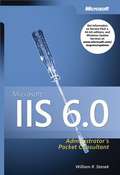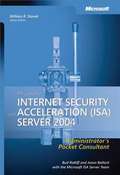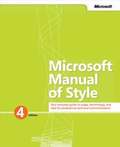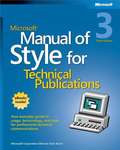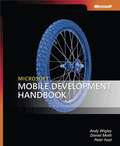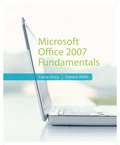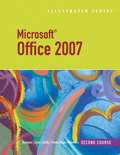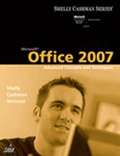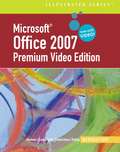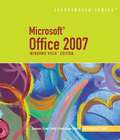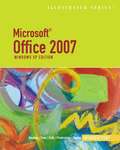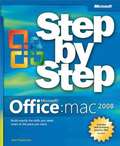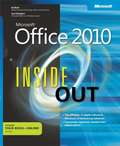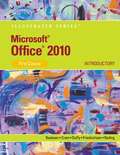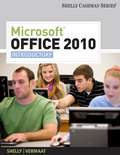- Table View
- List View
Microsoft® Expression® Web Plain & Simple
by Katherine MurrayHere's WHAT You'll Learn Design a dynamic site from a template or blank canvas Format text and graphics, add sound and other effects Add links to other Web pages or e-mail addresses Easily create interactive forms and buttons Publish your site and perform easy maintenance Here's HOW You'll Learn It Jump in wherever you need answers Easy-to-follow STEPS and SCREENSHOTS show exactly what to do Handy TIPS teach new techniques and shortcuts Quick TRY THIS! exercises help you apply what you learn right away This book is based on the first version of Expression Web.
Microsoft® Forefront™ Threat Management Gateway (TMG) Administrator's Companion
by Jim Harrison Yuri Diogenes Mohit SaxenaGet your Web security, network perimeter security, and application layer security gateway up and running smoothly. This indispensible, single-volume reference details the features and capabilities of Microsoft® Forefront® Threat Management Gateway (TMG). You'll gain the real-world insights, implementation and configuration best practices, and management practices you need for on-the-job results. Discover how to: Implement TMG integrated security features Analyze your Web and perimeter security requirements and infrastructure Plan, install, and configure TMG Implement network intrusion prevention, proxy, caching, filtering Configure security for the Web, Microsoft® Exchange Server, and SharePoint® Products and Technologies Implement remote access and site-to-site VPNs Select and configure clients Monitor and troubleshoot protected systems with Network Monitor 3 and other tools Use scripting to configure systems and automate administration Plus, get a fully searchable eBook on the companion CD A Note Regarding the CD or DVD The print version of this book ships with a CD or DVD. For those customers purchasing one of the digital formats in which this book is available, we are pleased to offer the CD/DVD content as a free download via O'Reilly Media's Digital Distribution services. To download this content, please visit O'Reilly's web site, search for the title of this book to find its catalog page, and click on the link below the cover image (Examples, Companion Content, or Practice Files). Note that while we provide as much of the media content as we are able via free download, we are sometimes limited by licensing restrictions. Please direct any questions or concerns to booktech@oreilly.com.
Microsoft® IIS 6.0 Administrator's Pocket Consultant
by William R. StanekPortable and precise, this pocket-sized guide delivers immediate answers for the day-to-day administration of Web servers running Microsoft® Internet Information Services (IIS) 6.0. Zero in on core IIS support procedures and everyday tasks using quick-reference tables, step-by-step instructions, and lists. You get the focused, streamlined information you need to solve problems and get the job done--whether you're at your desk or in the field! Get fast facts to: Install Web and application server components Learn core techniques for managing IIS Configure Web sites, servers, and virtual directories Customize Web content, including error messages and redirection Manage Web applications, application pools, and Microsoft ASP.NET Configure SMTP, POP3, and advanced messaging options Implement security features--permissions, certificates, SSL Monitor and optimize IIS performance Manage IIS backups and metabase configurations
Microsoft® IIS 6.0: Administrator’s Pocket Consultant
by William Stanek<div xmlns="http://www.w3.org/1999/xhtml"><p>This pocket-sized guide delivers immediate answers for the day-to-day administration of Web servers running Microsoft\xae IIS 6.0. Zero in on core IIS support procedures and everyday tasks using quick-reference tables, step-by-step instructions, and lists.</p></div>
Microsoft® Internet Security and Acceleration (ISA) Server 2004 Administrator's Pocket Consultant
by Bud Ratliff Jason BallardPortable and precise, this pocket-sized guide delivers immediate answers for the day-to-day administration of ISA Server 2004. Zero in on core support and maintenance tasks using quick-reference tables, instructions, and lists. You'll get the focused, straightforward information you need to solve problems and get the job done?whether you're at your desk or in the field! Get fast facts to:Install and configure ISA Server 2004 Upgrade from ISA Server 2000 Use scripts to automate recurring tasks Administer firewall, Web proxy, and SecureNAT clients Define networks and manage access policies and publishing rules Implement a multi-networking environment Set up VPNs and perimeter networks Configure ISA Server security features and detect intrusions Monitor system performance, traffic, and events Manage arrays with Active Directory Application Mode Optimize integration with other Windows Server System software
Microsoft® Lync® 2013 Plain & Simple
by Darren LloydGet the full-color, visual guide that makes learning Lync 2013 plain and simple! Follow the book's easy steps and screenshots and clear, concise language to learn the simplest ways to communicate and collaborate with colleagues and co-workers. Here's WHAT you'll learn: Set up your personal communication environment Communicate by voice, video, IM, and the web Add, monitor, categorize, and search for contacts Share content and set up conference calls on the fly Discover tabbed conversations and persistent chat Use Lync with other Microsoft Office programs Here's HOW you'll learn it: Jump in wherever you need answers Follow easy STEPS and SCREENSHOTS to see exactly what to do Get handy TIPS for new techniques and shortcuts Use TRY THIS! exercises to apply what you learn right away
Microsoft® Manual of Style
by Microsoft CorporationMaximize the impact and precision of your message! Now in its fourth edition, the Microsoft Manual of Style provides essential guidance to content creators, journalists, technical writers, editors, and everyone else who writes about computer technology. Direct from the Editorial Style Board at Microsoft--you get a comprehensive glossary of both general technology terms and those specific to Microsoft; clear, concise usage and style guidelines with helpful examples and alternatives; guidance on grammar, tone, and voice; and best practices for writing content for the web, optimizing for accessibility, and communicating to a worldwide audience. Fully updated and optimized for ease of use, the Microsoft Manual of Style is designed to help you communicate clearly, consistently, and accurately about technical topics--across a range of audiences and media.
Microsoft® Manual of Style for Technical Publications
by Microsoft CorporationDeveloped by Microsoft's senior editors and content managers, this manual of style captures the up-to-date standards and best practices for delivering clear and consistent technical communications. Now in its third edition, this popular reference has been fully revised, expanded, and optimized for ease of use. You'll find new coverage on meeting the needs of a global audience, accessibility concerns, and the latest technical terms and acronyms--along with expertly organized sections on usage, grammar, punctuation, tone, formatting, and common style problems. Whether you're creating print documentation, online help, Web content, or other communications, you'll get the information and examples you need to maximize the impact and precision of your message. Get clear, concise guidance to help you: Use technical terms correctly and consistently--including do's, don'ts, and alternatives for usage. Employ the appropriate tone and voice for your audience. Produce written and visual content suitable for a worldwide audience. Apply best practices for writing and tagging Web content. Write better documentation--from dialog boxes and error messages to Web pages and software code. Know the standards for creating accessible communications. Optimize your indexes, cross-references, and keyword lists. Get fast answers on spelling, grammar, and punctuation. CD includes: Complete eBook insideA Note Regarding the CD or DVD The print version of this book ships with a CD or DVD. For those customers purchasing one of the digital formats in which this book is available, we are pleased to offer the CD/DVD content as a free download via O'Reilly Media's Digital Distribution services. To download this content, please visit O'Reilly's web site, search for the title of this book to find its catalog page, and click on the link below the cover image (Examples, Companion Content, or Practice Files). Note that while we provide as much of the media content as we are able via free download, we are sometimes limited by licensing restrictions. Please direct any questions or concerns to booktech@oreilly.com.
Microsoft® Manual of Style for Technical Publications, Third Edition
by Microsoft CorporationGet the latest information on standards for technical writing and editing straight from the experts. This new edition completely updates and expands the industry's leading guide to creating quality technical documentation and content.
Microsoft® Mobile Development Handbook
by Andy Wigley Daniel Moth Peter FootGet practical information for developing applications with the Microsoft .NET Compact Framework 2.0--straight from mobile-development experts. This definitive guide delivers the proven techniques, real-world insights, and extensive code samples you need to bring information access to any Windows-based mobile device. Discover how to: Design a user interface that is optimized for smart devices Add functionality by using Windows® Mobile APIs Organize and persist data stored on a device Establish network connections and respond to changes in network state Synchronize mobile devices with data stored on backend servers Implement authentication, symmetric encryption, and asymmetric encryption algorithms Optimize application performance for resource-constrained devices Interoperate with native code by using PInvoke and COM interop PLUS--Get an introduction to .NET Compact Framework 3.5 and Microsoft Visual Studio® code name "Orcas" PLUS--Get Microsoft Visual C#® and Visual Basic® code samples on the Web
Microsoft® Office 2007 Fundamentals
by Dawna Walls Laura StoryTeach your introductory level class the essentials of Microsoft Office 2007 applications with MICROSOFT OFFICE 2007 FUNDAMENTALS. This text is ideal for inexperienced computer users who need to learn Microsoft Office 2007 skills for everyday life. Although introductory in nature, this text is comprehensive enough to cover the most important features of Word, Excel, PowerPoint, Access, and Publisher.
Microsoft® Office 2007 Illustrated: Second Course
by David Beskeen Carol Cram Jennifer Duffy Lisa Friedrichsen Lynn WermersPart of the Illustrated Series, this practical, easy to navigate book provides the essential knowledge of Microsoft Office 2007 you need to succeed in both the classroom and beyond.
Microsoft® Office 2007 Introductory Course
by Beth Pasewark Wadsworth Carolyn Denny Pasewark Jan Pasewark Stogner Scott G. Pasewark William R. Pasewark Robin M. RomerThis text includes features that make learning easy and enjoyable - yet - challenging for learners. The text includes a wide range of learning experiences from activities with one or two commands to simulations and case studies that challenge and sharpen learners' problem-solving skills.
Microsoft® Office 2007: Advanced Concepts and Techniques
by Gary B. Shelly Thomas J. Cashman Misty E. VermaatIn Microsoft Office 2007: Advanced Concepts and Techniques you?ll find features that are specifically designed to improve retention, and prepare readers for future success. Our trademark step-by-step, screen-by-screen approach now encourages users to expand their understanding of the Office 2007 software through experimentation, exploration, and planning ahead.
Microsoft® Office 2007: Illustrated, Premium Video Edition, Introductory
by David Beskeen Carol Cram Jennifer Duffy Lisa Friedrichsen Elizabeth Eisner RedingGive your students a comprehensive, hands-on, and engaging learning experience with the MICROSOFT OFFICE 2007-ILLUSTRATED INTRODUCTORY PREMIUM VIDEO EDITION. This Premium Video Edition includes a Video Companion containing approximately 150 videos each based on a two-page lesson in the book, 10 Capstone Projects and SAM Projects instruction files to help Bring Learning To Life For both the computer rookies and the computer hotshots û MICROSOFT OFFICE 2007-ILLUSTRATED INTRODUCTORY PREMIUM VIDEO EDITION appeals to all the learners, covering the essential information that users need to know now. Our signature two-page spread design has been updated and refreshed to take full advantage of the new features of the Office 2007 software. This practical, easy-to-navigate book provides readers with the essential knowledge they need to succeed in both the classroom and beyond.
Microsoft® Office 2007: Illustrated, Windows Vista Edition, Introductory
by David Beskeen Carol Cram Jennifer Duffy Lisa Friedrichsen Elizabeth Eisner RedingThis Microsoft Office 2007 Illustrated Series book covers the essential information that you need to know now for Microsoft Vista 2007. Our signature two-page spread design has been updated and refreshed to take full advantage of the new features of the Office 2007 software. This practical, easy to navigate book provides you with the essential knowledge you need to succeed at both work and beyond.
Microsoft® Office 2007: Illustrated, Windows® XP Edition, Introductory
by David Beskeen Carol Cram Jennifer Duffy Lisa Friedrichsen Elizabeth Eisner RedingThis Microsoft Office 2007 Illustrated Series book covers the essential information that you need to know about how to use Office 2007 applications. Our signature two-page spread design has been updated and refreshed to take full advantage of the new features of the Office 2007 software. This practical, easy to navigate book provides you with the essential knowledge you need to succeed at both work and beyond.
Microsoft® Office 2007: Introductory Concepts and Techniques, Windows XP Edition
by Gary B. Shelly Thomas J. Cashman Misty E. VermaatIn Microsoft Office 2007: Introductory Concepts and Techniques Windows XP edition you?ll find features that are specifically designed to improve retention, and prepare readers for future success. Our trademark step-by-step, screen-by-screen approach now encourages users to expand their understanding of the Office 2007 software through experimentation, exploration, and planning ahead.
Microsoft® Office 2008 for Mac Step by Step
by Joan LambertCovers Microsoft Word, PowerPoint, Excel, and Entourage 2008 for Mac Experience learning made easy--and quickly teach yourself how to use Microsoft Office 2008 for Mac--one step at a time. With STEP BY STEP, you set the pace--building and practicing the skills you need, just when you need them! Create basic to advanced Word documents using templates Design impressive PowerPoint presentations Produce data-rich Excel workbooks and attractive charts Manage communication and scheduling with Entourage Create stylish graphics with just a few clicks Master handy keyboard shortcuts for common tasks Your STEP BY STEP learning experience includes: Files for building skills and practicing the book's lessons--available on the book's companion Web site Author's picks for 14 great how-to articles online Practice files available at: http://www.microsoft.com/mspress/ companion/9780735626171
Microsoft® Office 2010 Inside Out
by Carl Siechert Ed BottDive into the essential features in Microsoft Word 2010, Excel® 2010, OneNote® 2010, Outlook® 2010, and PowerPoint® 2010. This supremely organized reference is packed with hundreds of timesaving solutions, troubleshooting tips, and workarounds. It's all muscle and no fluff. Let the experts help you become at ease and proficient with every program in the Office family. Create great-looking documents using expert formatting tips. Build spreadsheets for complex calculations and data analysis. Save notes, clippings, web pages, and more in a notebook. Create dynamic slides and video-powered presentations. Expertly manage your inbox and business information. Protect your security and safeguard private information. Collaborate with Windows Live SkyDrive and SharePoint.
Microsoft® Office 2010 Plain & Simple
by Katherine MurrayGet the fast facts that make learning Office 2010 plain and simple! This colorful, no-nonsense guide uses easy-to-follow steps and screenshots, and clear, concise language to show the simplest ways to get things done with Microsoft Word, Excel®, Outlook®, PowerPoint®, Access®, Publisher, and OneNote®. Here's WHAT You'll LearnCreate documents, Web pages, and other publications Organize your e-mail, calendar, contacts and tasks Build spreadsheets to analyze and visualize data Set up a simple database Capture notes with ink, voice or text Here's HOW You'll Learn ItJump in wherever you need answers Easy-to-follow STEPS and SCREENSHOTS show exactly what to do Handy TIPS teach new techniques and shortcuts Quick TRY THIS! exercises help you apply what you learn right away
Microsoft® Office 2010, Fundamentals
by Dawna Walls Laura StorySuitable for inexperienced computer users who need to learn Microsoft Office 2010 skills for everyday life, this text is comprehensive enough to cover the important features of Word, Excel, PowerPoint, Access, and Publisher.
Microsoft® Office 2010, Introductory
by Beth Pasewark Wadsworth Carolyn Denny Pasewark Jan Pasewark Stogner Katherine T. Pinard Rachel Biheller Bunin Jessica Evans William R. Pasewark Sr. Robin M. Romer Scott G. Pasewark Jr.This Microsoft Office 2010 Introductory text, part of the Origins Series, includes features that make learning easy and enjoyable, yet challenging for learners. Students receive a wide range of learning experiences from activities with one or two commands to simulations and case studies that challenge and sharpen learners' problem-solving skills. This is a hardcover text.
Microsoft® Office 2010: Illustrated Introductory, First Course
by Carol Cram Jennifer Duffy Lisa Friedrichsen Elizabeth Eisner Reding David W. BeskeenLoved by students for its visual and flexible way to build computer skills, the Illustrated Series is ideal for learning Microsoft Office 2010 for both computer rookies and hotshots.
Microsoft® Office 2010: Introductory
by Gary B. Shelly Misty E. VermaatMicrosoft Office 2010: Introductory provides a project-based, step-by-step approach to teaching the Office 2010 applications.


